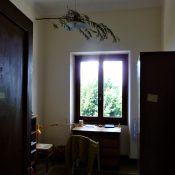«Amai trite parole che non uno/ osava. M’incantò la rima fiore/ amore, / la più antica difficile del mondo. // Amai la verità che giace al fondo, / quasi un sogno obliato, che il dolore / riscopre amica./ Con paura il cuore / le si accosta, che più non l’abbandona. // Amo te che mi ascolti e la mia buona / carta lasciata al fine del mio gioco.»
“I loved trite words that not one/ dared. I was enchanted by the rhyme flower/ love, / the most ancient difficult in the world. // I loved the truth that lies at the bottom, / almost a forgotten dream, that pain / rediscovers as friend./ Fearfully the heart / approaches it, so that it no longer abandons it. // I love you who listen to me and my good / card left at the end of my game.” (Amai, Umberto Saba).
Umberto Saba’s poem makes me think of searching. The author seems to find through art and the exercise of writing a truth of things and in things, a truth that is “at the bottom”. It is not on the surface, it is not immediately visible but must be sought. He uses the verbs “rediscover” and “approach”. They express the attitude of the listener. I imagine Saba not struggling with the domineering possession of the truth of things that clash with him, that he encounters. Rather it is a searching that listens, awaits and contemplates what emerges from the particular and daily contact with life. And only later does it elaborate, think, recognise themes.
The other important emphasis is the delicacy expressed by the rhyme “fiore amore” (literal translation: “flower love”) in the presence of which the poet feels enchanted. The truth which Saba writes does not impose itself as a mathematical rule guaranteed by incontestable transitions. It is delicate, respectful, subtle, soft… it seems to enter the composition and the author’s life almost on tiptoe.
The other characteristic is otherness. The truth or the message or, to use a grandiose term, cultured teaching is not possessed from the beginning, it is not in the hands and the mind of the poet. Rather, listening and contemplating, he is found by and lets himself be met by this truth.
Searching/listening, delicacy, otherness. These are the three words that also describe my relationship with the Word of God. Let me specify that the experience which I will refer to in this article is the meditation on a biblical text, albeit aware that God can give whenever he wants an experience that could be considered his Word.
When I pray I experience what Saba writes in Amai. I sit, close my eyes, I try to create internal silence and direct my attention to the Lord. I read the passage on which I chose to dwell in prayer. A term or a phrase strikes me, questions me, intrigues me, involves my affectivity and caresses it. I realise that this is an appointment with the Lord, it is the place where he wants to communicate something to me, a message. So I think and think again, I keep dear that term or phrase in my mind … in a word: I listen. I place myself in a listening attitude.
Various outcomes are possible. Maybe a situation that I’m experiencing becomes clear or a memory emerges that explains something of my present or a desire is roused which I was not aware of before. And this interior movement is accompanied by consolation, by a delicate and tranquil joy. Bar possible exceptions, the Lord is not an earthquake that overwhelms, but a light breeze. He speaks to me gently.
The prayer ends and I move on to doing other things, but there remains the awareness that that Word, that experience of closeness of the Lord or of a message communicated to me, however you wish to call it, is an encounter with an otherness. I found myself face to face with an Other, I did not elaborate that Word in a self-referential solitude. It was pronounced for me by a mouth which was not mine.
Listening, delicacy, otherness … also describe a second experience that I live out once a week, on Tuesdays.
Since November, in fact, every Tuesday, I go to a parish outside Genoa, to give catechism lessons to ten seven-year-olds, who attend the second grade of elemetary school. It is the first time that I find myself living this apostolate. I immediately realised that it is not always easy to transmit content. Children ask for listening. I assume this attitude to understand what language to use, what tools. They need a language which is essential, simple, but at the same time clear and open to possible unexpected questions, to their just curiosity. An instrument that I often use is drawing. I noticed that they like it and that it allows them to remember what I say. But it’s not just this… there’s more! Listening to children also means always returning to the centre of faith without too many shortcuts: the relationship with the person of Jesus.
Children do not impose themselves, just like the truth of which Saba writes or the Word of the Lord. They present themselves to you with sprightly eyes full of confidence, with their voice crowded with question marks and little anecdotes to tell, their perplexity if they do not understand what I propose. They are the image of delicacy. They are like the light breeze. Despite their sometimes rowdy liveliness, they retain a delicate approach, almost on tiptoe.
Finally, children are surprising. Their ability to bring me back to the centre of the relationship with Christ in a delicate but decisive way allows me to meet an otherness. They teach me something about God and something about me: they are custodians of a message other than me. They reveal for example how important and beautiful it is that I can take care of someone, of them.
I am, and I say this not following some empty rhetoric, I say it because I am aware, a gift.















Comments